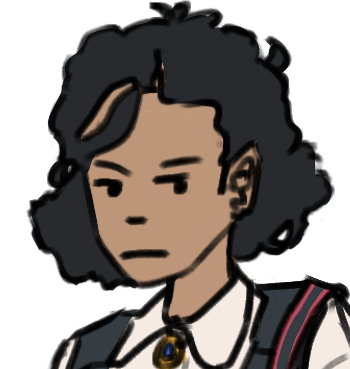NEW Story: Cocktail
Supermarkets in Vekllei

This article is not part of Vekllei canon. It may be old, obsolete or just a bit of fun.
In Vekllei, the economy is a social organ that lingers awkwardly between cultural and political interests. On one hand, the country is regressing (both politically and culturally) towards deindustrialised, decommodified life. On the other, it is irreversibly equipped with the benefits of automation and robotics, rendering large swathes of the labour-force obsolete. Work is now, for most purposes, a creative organ that facilitates society, culture and technology. This has led to a society not unlike most planned economies, in which employment is both essential and unnecessary, leading to vast wastage and consumption at scales a market would see as horrifically inefficient but in Vekllei is understood as an enormous social benefit. Some people must still work — so everyone must work in fairness. In Vekllei, employment is casual and often unrecorded except by the syndicates, as per the foundations of Sundress Municipalism. As long as you are working, studying or otherwise justifying a life in Vekllei (raising your children or training for competitions, perhaps), then you’ll be left alone to do what you like.
Since everyone must work, there are many archaic jobs in Vekllei, especially for those still figuring out what they want to do with their lives. The supermarket now rules across most of the world, but in Vekllei there are only a handful of chains with few stores, simply because the provincial self-interest of Sundress Municipalism is sympathetic to individual stores populated by a community, rather than chains. The corner grocer is king.
Since these supermarkets are often built in imitation of the west, and are remarkably un-Vekllei, the largest three chains are illustrated above for your benefit.
Comen Grocer is the only pre-Atomic War supermarket company in Vekllei, and offers mostly special-interest or foreign products. It actually operates under the same retail bureau that runs the Farmer’s Syndicate, but is independent. It is run by a board of representatives from each store, whom are elected. Roman here has platinum hair and is a good example of an ethnically Scandinavian Vekllei person, who has descendants dating back to the 11th century.
Joyloaf operates in the Lola district of Vekllei’s capital, and is a popular day job for artistic young women who otherwise do not have the means or time to socialise with people their own age. It started as a bakery in 2064 but has since grown to stock many different kinds of foods. It is quite fashionable in Lola, and appears in cultural material originating from that district (as seen in several comics and films). Tzipora has dark hair and a round face, but blue eyes and fair skin. She is a descendent of both Inuits and Scandinavians, making her a member of the second-largest ethnic group in Vekllei.
The Farmer’s Syndicate is both a name and a description of Vekllei’s venrouive food retail arm, which means that it is beholden to the direction of the country and would be the organisation called upon to provide rations in the event of war. It is a collective of agricultural villages and organisations and operates as a distributor of these products directly. It almost exclusively stocks Vekllei products, as well as “items of cultural significance” that are traditionally eaten in ceremony and ritual, but are otherwise most popular with Vekllei’s elderly population. The Farmer’s Syndicate is the largest supermarket chain in Vekllei, but very few of its stores are actually supermarkets — many individual grocers senrouive business operate under the Syndicate’s structure, but often do not brand themselves as such.
Supermarkets are fundamentally a novelty in Vekllei, which has a vibrant cafe reputation and in which most food prepared at home is grown locally. Food production is a very important part of Vekllei culture and Upen, and the desacralising effect of chains are symptoms of an industrial, globalised society. This is an unattractive proposition to a country rapidly approaching isolationist pre-industry, in which the cycles of production and consumption are both visible and important.
